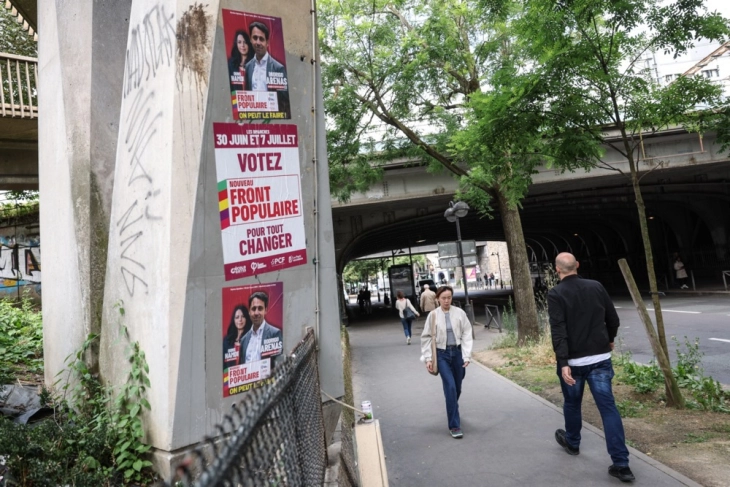France votes in second round of high-stakes parliamentary election
- France returned to the polls on Sunday in the second round of parliamentary elections, with all eyes on whether Marine Le Pen's far-right National Rally party can win an unprecedented absolute majority in the National Assembly.
- Post By Silvana Kocovska
- 11:29, 7 July, 2024

Paris, 7 July 2024 (dpa/MIA) - France returned to the polls on Sunday in the second round of parliamentary elections, with all eyes on whether Marine Le Pen's far-right National Rally party can win an unprecedented absolute majority in the National Assembly.
Polling stations for the run-off elections opened across mainland France at 8 am (0600 GMT), after voting began on Saturday in the country's overseas territories. Results are expected in the evening.
An outright victory for the anti-immigration National Rally, which won the first round of elections a week ago, would mark a turning point in France's history and have major implications for European politics.
The latest opinion polls forecast Le Pen's party and its allies securing 205 to 240 representatives in the 577-seat National Assembly, short of the 289 required for an absolute majority in the lower house.
Second place is expected to go to the New Popular Front (NFP), a new alliance that has brought together Jean-Luc Mélenchon’s hard-left La France Insoumise (France Unbowed), the Socialist Party, the Communist Party and The Ecologists.
President Emmanuel Macron, who called the snap vote in the wake of the far-right's victory in June's European Parliament elections, has seen his centrist camp slip to third in the polls.
Just 76 of the 577 seats were allocated in the first round, meaning the top candidates in the remaining constituencies now face off in a run-off.
Macron's Ensemble (Together) alliance and their leftist rivals have scrambled to block Le Pen from attaining an absolute majority, with more than 200 candidates standing down to avoid splitting the vote in Sunday's run-off.
A far-right government?
France faces the prospect of a far-right majority in parliament for the first time in its post-war history.
Should the National Rally secure the necessary 289 seats to win outright, Macron will be under overwhelming pressure to nominate the party's parliamentary leader Jordan Bardella as prime minister.
This could usher in France's first cohabitation - a term used for periods when the president and prime minister are in political opposition - since 1997.
If Le Pen's party narrowly fails to secure an absolute majority, it could turn to the conservative Republicans, the party of disgraced former President Nicolas Sarkozy.
The centre-right party could prove to be a kingmaker, with polls putting the group on around 10%.
The most likely scenario heading into Sunday's vote is a hung parliament, with no party or alliance attracting enough support to govern.
Macron's centrist camp was the biggest force in the National Assembly but is unlikely to end up close to the 245 seats it had before the snap elections.
The NFP, meanwhile, has said it does not want to rule in a national coalition.
This could leave France at a political standstill under a possible caretaker administration led by current Prime Minister Gabriel Attal, with more than two years to go until the next round of presidential elections in 2027, which Le Pen is favoured to win. Macron cannot run again.
Photo: EPA







